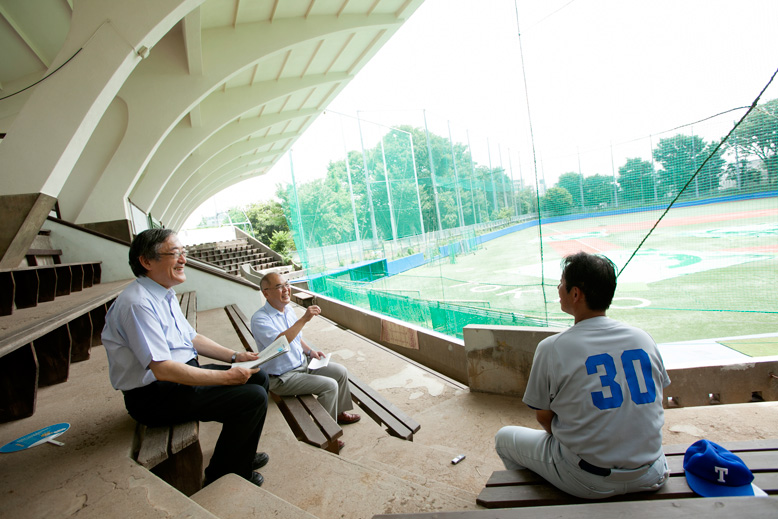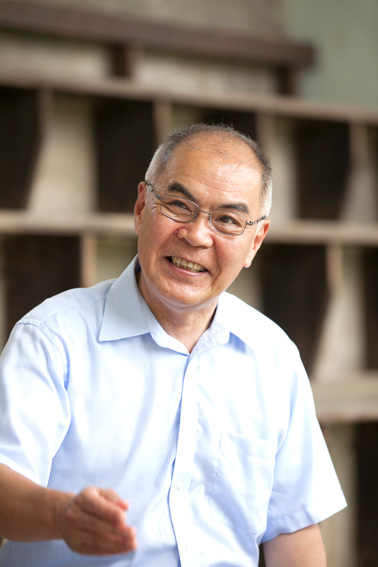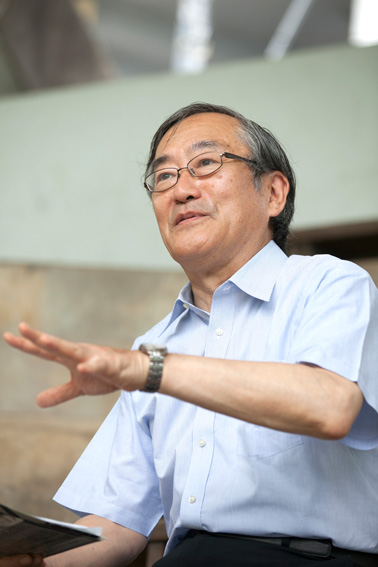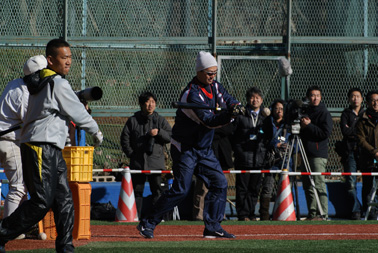Hasegawa: It was one of the former presidents of the University, Prof. Kazuo Okochi, who said 40 years ago, "Instead of being a fat pig, become a lean Socrates." Current President Junichi Hamada has also spoken often about the "resilient students" of the University of Tokyo. What are your thoughts about the relationship between university education and sport?
Furuta: These days there are so many peaks around the world that are now accessible, it is difficult for young people today to simply focus on Mt. Fuji, for example, and decide that taking up the challenge of reaching that single peak is sufficient. In a world in which students are roaming the world, seeking out mountain ranges or challenges other than those directly before their eyes, I think that one of the vitally important things a university education must provide is a strong will and sense of determination. Academic learning and sport have the same kind of basic structure. They both require a person to methodically set out the groundwork that will provide a firm foundation from which to advance, and to clearly understand the goal to which they aspire. Overcoming the initial pain and difficulty and succeeding in establishing the groundwork is the most important part and it is sport in general and sports clubs in particular that can provide the discipline to overcome initial challenges. I believe that sports clubs therefore play an important role in university education.

Kazushi Hamada
A former captain of the University team and clean-up hitter who scored five home runs in the Jingu Stadium during his time at University. He is the president of AI Seibu Gakuin, which is a training school that focuses exclusively on extra-curricular and club activities. In 2008 he launched a baseball scouting office and in 2012 was appointed as coach of the The University of Tokyo baseball team. His publications include How to get into the University of Tokyo without giving up extra-curricular activities (Chukei).
Talent isn't something that can be taught, but using the value of experience is essential
Hamada: My understanding of the "resilient" in "resilient University of Tokyo students" is cultivating students who are not afraid of failure. However, when I first came to the University as a coach there were many students who were gripped by such fears. For example, one of the basic parts of baseball is to attempt to steal base. In the face of an opponent there is probably only a 50/50 chance that your strategy will be a success. However, in the past there were few University of Tokyo students who had actually had the experience of sticking their necks out in the face of 50/50 odds, based on the belief that they could win, even against such odds. Such a mindset could also lead to fear of academic failure or a failure to take up challenges. I think that the role of sport is to build up in young people the resilience-or determination-to take up a challenge and succeed.
The difference between the University of Tokyo and other strong university teams is experience. The players on other university teams generally have had around 5,000 hours of playing experience by the time they reach university. University of Tokyo team members usually have half that. When you think of the three factors of experience, talent and strength, while talent is something that can't be taught, through building up strength and experience it is possible to catch up with other teams. In actual fact, when you look at the numeric data for University of Tokyo team players, you can see that in terms of thigh circumference, for example, they are no different to the team players of other universities.
Hasegawa: You also have a very robust pair of thighs yourself.
Hamada: It's perhaps the last vestige of what I built up during my own baseball club days (laughs). At the very least the regular team players develop thigh muscles that are no different to those of other university teams. However, it takes about three years to develop these muscles. A person's experience is in proportion to the number of matches he has played. Thanks to the fact that the baseball ground has been refurbished and developed we are now able to play double the number of practice games we could hold in previous years, so the experience of the our players should increase further.
Hasegawa: Prof. Furuta, as chairman of the Athletic Foundation you see many students playing sport, so what do you think are the defining characteristics of University of Tokyo sportsmen and women?
Furuta: On average there are approximately 2,200 students that are members of one of the University's sports clubs. That means that about one in seven students is a member. When you also include the various other sporting clubs and circles you can appreciate that there is a very large number of students engaged in sport on a regular basis at the University. Each year the Athletic Foundation distributes a questionnaire to new students and each year the results show that a great majority of students have an interest in sport. Most people's image of University of Tokyo students is of people who are almost exclusively academic, but that is not necessarily the case. I think that the reality is rather that because University of Tokyo students tend to be the type of person that sets their goals and progresses steadily towards achieving them, many of them also have the right mindset to become sportsmen or women.
In terms of extra-curricular activities that encourage students to become more active outside the classroom, I think that the following four events and organizations play an important role in university life: the two University festivals, the University of Tokyo Newspaper, the University of Tokyo Co-op Students' Association, and the Athletic Foundation. The Athletic Foundation is special in that it is the only one of these four that seeks to encourage students to exercise their bodies.
Hasegawa: Prof. Furuta, you became chairman of the Athletic Foundation six years ago, didn't you?
Furuta: I was invited to take up the position by the then-chairman, Prof. Michikata Kono. My first reaction was to decline, saying, "From a young age physical education lessons were the ones I liked least and although I did judo in junior high and high school, in matches I hardly ever managed to throw any of my opponents. In the end I was granted first-dan (level) status, more out of pity than anything. I don't think a person like that could be chairman of the Athletic Foundation." Prof. Kono responded, "One in three of all University of Tokyo professors are just like you. It is exactly because there are so many people like you that we need such a person to head the Athletic Foundation and continue to make the presence of the University's sports clubs felt." His words convinced me and I agreed to take up the position.
Hasegawa: The other day the Sousei-sen took place at Kyoto University (The Sousei-sen is the regular general sporting competition between the "light blues" of the University of Tokyo and the "dark blues" of Kyoto University that has developed from regular competitions between individual sports clubs and was held for the fifth time this year). When President Hiroshi Matsumoto of Kyoto University looked at the win-loss records for the Sousei-sen, he remarked that "The University of Tokyo is strong in the more elegant sports." I took that to mean that The University of Tokyo is strong in sports where brains and strategy come to the fore, rather than strength alone. What is the actual situation?
Hamada: I think there is a tendency we can see where the University of Tokyo is strong in sports that are not often played in secondary school. These include such sports as body-building, lacrosse and rowing.
Furuta: There are a number of other similar examples, such as the victory of Masataka Kenda from our Aviation Club in a national contest in March, and the fact that athletes from the University of Tokyo took part in the World Taido Championship in August.
Hamada: If you're talking in terms of the spirit and mentality of the members of sports clubs, I really feel that the desire to become stronger and more competitive is shared by all the members, not just the baseball club. As soon as word gets out that the baseball club is trying out a new training method, there are so many people from other clubs who come to watch. Also, I believe that the back muscle strength of all University of Tokyo students-even those not engaged in sporting activities-is the strongest among all students. Although I don't have data to back this theory up it is a fact that students who are able to study well have good posture and this is something that naturally exercises and develops the back muscles.
Hasegawa: As someone with bad posture, that is something I didn't want to hear (laughs).
Furuta: One of the characteristics of the sports clubs is that their members are many and varied, with diverse levels of competitiveness, from those who could compete at the global level, to those who have joined a sporting organization for the first time. We have structures in place that are able to encourage each and every student, no matter what their level, and help them achieve results and provide assessment and evaluation. I think that by providing such an environment helps students to improve their versatility in both their academic and extra-curricular activities.

After the discussion, Coach Hamada presented the two professors with commemorative baseballs. Maybe their first appearance is near?!
Photo: Junichi Kaizuka.
Problems facing the University of Tokyo's sporting facilities: Aging and the need to support the needs of female students
Hasegawa: The University of Tokyo has many wonderful sporting facilities, such as this baseball ground. The hockey and rugby fields at Komaba Campus have also been astro-turfed. However, there are various facilities that are suffering from age and are in need of attention. Ensuring that facilities remain fit for purpose and offer the best to students is a difficult challenge that requires time and money, isn't it?
Furuta: The University baseball ground was fortunate enough to benefit from the support of many people and in a far shorter time than we anticipated we were able to refurbish and improve the ground. However, as you rightly note, there are many cases where clubs and club members do not have changing facilities and are forced to change in front of classrooms. There are also those who point out that there are no toilet facilities close to some training grounds and others who ask for something to be done because students engaged in sports regularly use the toilet and washroom facilities of other buildings close to their training grounds. This is the reality that we face.
Hamada: At the baseball ground it was last year that we had toilet facilities for women installed. I think that the lack of toilets and changing rooms for female students is one of the major problems we face.
Furuta: Exactly. Of the 2,200 members of the various sports clubs, 500 are female. The proportion of females who are members of the Athletic Foundation is considerably higher than the total proportion of male to female students at the University. I also believe that an urgent and pressing issue is to develop facilities that will support the activities of female members, including the creation of toilets, changing rooms and showers, and so on.
Hasegawa: Last year, when I was dean of the Graduate School of Arts and Sciences, we used the profit on investment generated by the University of Tokyo Foundation to refurbish a block of old toilets and changing rooms next to the tennis courts on the Komaba Campus. We are gradually making progress with refurbishments but there is still much to do. Each of the sporting clubs and associations of the University have a strong and functioning alumni network and the alumni are providing active support. We would be unable to operate all the current facilities with the official funds currently allocated for running costs and therefore, with the support of alumni, we hope to continue to build and develop the facilities we have.
Sport is something that you not only enjoy doing, it is something that spectators also enjoy watching. There is a really special and unique atmosphere at the sports grounds and I would like to encourage current students and alumni to visit the various grounds and watch the sport that is being played there. Since becoming executive vice president I have paid visits to Jingu Stadium and the Toda Boathouse-my first visits to both facilities in many years-and they truly do have a good feel. Watching young people sweating it out on the pitch or field is something that never fails to inspire and surprise you.

Toshikazu Hasegawa
Professor at the Graduate School of Arts and Sciences. After serving as the dean of the Graduate School of Arts and Sciences, in April 2013 he was appointed executive vice president of the University. His area of specialization is behavioral ecology and evolutionary psychology. He is a dog lover and shares his home with his beloved poodle Kikumaru. He says, "In junior high and high school I played basketball, table tennis, handball and football, but I wasn't much good at any of them." Photo: Junichi Kaizuka.
Furuta: One of my aims was to boost the number of students going to watch and support games, and at the Athletic Foundation we are implementing student-organized supporter tours, which are not only limited to Jingu Stadium. I hope that we can include sport supporter tours into student-targeted experience programs.
Hamada: At the baseball club we hope to increase spectators by winning more games. I want to create a sense of anticipation, where students know that the baseball team is strong and doing well and want to come to Jingu Stadium to see a game. I think that during high school, if you are at a school that has many strong sports clubs and teams, the academic side also improves and school cultural festivals also gain added momentum and excitement. I believe that the same could be said for the University of Tokyo: if the sporting clubs and associations put in a good performance, this will lead to increases in the number of patents registered and the number of academic papers published.
Hasegawa: In the past, as part of my research I have tracked chimpanzees in Tanzania and in such fieldwork, what is always of greatest importance is not the knowledge in my head, but rather to ensure that my limbs keep moving. In my area of research, physical strength and stamina is a prerequisite. Drive and motivation is also important and this is closely allied with physical strength. I think that researchers and athletes are the same in many ways-both set out their goals clearly and work towards them steadily, sometimes taking a long way round or suffering injury, but always moving forward surely and steadily through trial and error. Whether it be through trial and error, or even doing something for fun, if you have a deep-seated desire to do something and see whether it bears fruit and is useful in the future, then it will lead through to results. This is something that is common to both sport and academics.
Furuta: My area of research also involves trekking round rural villages overseas for fieldwork and physical strength and stamina are essential. In the case of science, take for example people who are engaged in experiments on animals, they require great perseverance and strength, as their research subjects are always on the move and require constant monitoring.
Students are empowered and emboldened by having the benefit of a role model close at hand
Hasegawa: Coach Hamada, you are currently engaged in reforming and restructuring the baseball team. What did you have in mind when you invited Mr. Masumi Kuwata to take up the position of team coach?
Hamada: My first thought was about the importance of battery and building up our catchers, so my first instinct led me to call upon Coach Naruki Imakurusu, who has played for Yokohama (then the Taiyo Whales, now the DeNA Baystars) and Seibu Lions. Coach Masumi Kuwata had partnered with Imakurusu for many years at PL-Gakuen for battery. That was what led me to approach him. It really was a stroke of luck to be able to reach out to him (laughs). I believe that the most important qualities for a coach are to have had experience teaching junior high and high school baseball, to have charisma, and also to listen to the players. Coach Kuwata fits the bill perfectly.
Hasegawa: I get the impression that the way Coach Kuwata teaches and trains is perfectly aligned with the goals of the University of Tokyo baseball team.
Hamada: Yes. He is an extremely rational person-one of the things he emphasizes is not to train endlessly for long hours, but to engage in intensive training over a short time period. If you consider excellence in both academic studies and sporting activities to be a prerequisite, then just such a rational approach is absolutely essential. Currently total practice and training has been reduced to three hours and during exam periods all training is stopped. Another wonderful thing about Coach Kuwata's presence is that the players can learn through example, and a brilliant example at that.
Hasegawa: Coach Kuwata can still pitch balls at speeds exceeding 130km/h can't he?
Hamada: Yes. Basically, if team players have good examples to learn from the team gets stronger. The reason that the traditionally strong teams remain strong is because they can look to their predecessors as role models.

Motoo Furuta
Professor at the Graduate School of Arts and Sciences. He serves as director of the University Library and also as director of the Division for Counseling and Support (DCS). He has previously served as dean of the Graduate School of Arts and Sciences and executive vice president and in 2007 took up the position of chairman of the Athletic Foundation of the University of Tokyo. His area of specialization is the modern history of Vietnam. One of his hobbies is fishing, which he says is "Rather than being a sport is something I do in order to eat what I catch." He also serves as head of the wrestling club.
Hasegawa: The same can be said for academic studies too.
Hamada: Precisely. It is often the case that if an older student can set a good example and succeed in advancing to a good school, that student's juniors also strive to follow the example. It is important to have someone who can act as a benchmark or milestone for times when you may be at a loss, and also to have someone close at hand who can set a good example. That was one of the main reasons why I invited Coach Kuwata to take on the role.
Hasegawa: What sort of results are you seeing from the reformed structure?
Hamada: I think that the players' worries and concerns have decreased. In the past there seemed to be a chronic sense of unease about whether the team could win or not, but that has now been dealt with and is no longer a concern. Although there may still be some things to iron out, I believe that going forward under the new structure we will see solutions present themselves. Coach Kuwata has a real knack for explaining things clearly and in a way that everyone understands. I think that we are now at the stage where we are coming out of the darkness and starting to see the light.
Hasegawa: I think that we are close to seeing results. President Hamada has already said publicly that he wants not just a win at Jingu Stadium, but the trophy itself!
Hamada: We are working towards getting our hands on the trophy, but before that we are concentrating on achieving four wins during the autumn season. I think that once we get one win, others will follow, but achieving that first win will not be a walkover. In the spring season our second year students played particularly well and we were able to trounce Waseda. I hope that results like that will continue.
Furuta: I have another year-and-a-half before I retire, and I would really like to experience the thrill of a victory for the baseball club. I hope that we can also win the Seven Universities Athletic Meet in succession and I would like to see the victory parade on campus. Last year the table tennis club managed to secure the title after a nail-biting game and I would like to experience such excitement once again.
Hasegawa: I will also be waiting expectantly for a report on our performance. I will also have to work on my back muscles (laughs).
Coach Masumi Kuwata is pioneering changes in the baseball club

"Everyone does exactly what Coach Kuwata says. What I say seems to go over their heads as if I hadn't said it! (laughs)" (Coach Hamada)
Coach Masumi Kuwata was appointed as a special coach for the baseball club in January 2013 and he continues to conduct team training once a week. When he first came to the University of Tokyo what he found surprising was that the team players were training too hard. He put it like this, "They (the team players) were practicing almost 12 hours a day. That is way too serious and does no-one any good. If you practice something that is wrong repeatedly it only has the opposite effect from the intended one. What is important is to think about how training can be condensed into intensive sessions that are really full of content." This approach was already one that Coach Kuwata was following himself during his time at PL Gakuen and he submitted a special training plan based on this short-period, intensive training model to Coach Hamada. This training method was the result of his own ideas on ensuring that he, someone of small stature, could carry on playing baseball for as long as possible. This type of training should resonate strongly with University of Tokyo students who are used to rational and logical thinking. Says Kuwata, "After all, the team members are students, and I want them to give proper attention to their studies as well as baseball. Free time, leisure and love are also important. This is because the tactics of love and romance are ones that a hitter will also understand. I don't want players to be exclusively devoted to baseball-it would be better for them to concentrate on having a well-balanced student life." Coach Kuwata is evidently the personification of "thinking baseball," and someone who questions conventions and received thinking. With luck, the results of his approach will become apparent at Jingu Stadium.[The University of Tokyo came fourth in the university league.]





